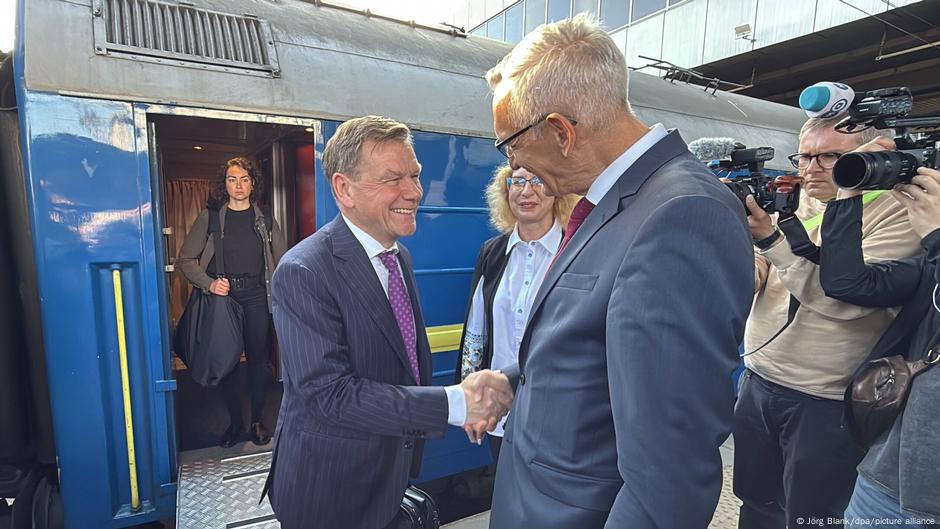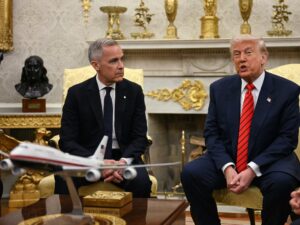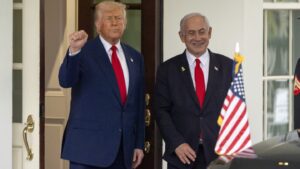
On an unannounced visit to Kyiv, German Foreign Minister Johann Wadephul declared Ukraine’s freedom as the “most important task” in Berlin’s foreign policy. This visit, marked by promises of continued support, comes amidst ongoing Russian bombardments and military advances.
Arriving by train on Monday morning, Wadephul emphasized Germany’s commitment to Ukraine’s defense, stating, “We will continue to stand firmly by Ukraine’s side so that it can continue to defend itself successfully — with modern air defense and other weapons, with humanitarian and economic aid.” He further criticized Russian President Vladimir Putin, asserting, “Putin is not ceding on any of his maximalist demands. He doesn’t want negotiations; he wants a capitulation.”
Germany’s Strategic Support for Ukraine
The German Foreign Ministry released a statement quoting Wadephul: “Ukraine’s freedom and liberty is the most important task in our foreign and security policy.” This visit marks Wadephul’s first to Kyiv since taking office in May, following a previous visit to Lviv. His arrival comes as Ukraine faces intensified Russian military actions.
On Saturday night, Ukraine’s Air Force described facing the “most massive airstrike” since the start of Russia’s full-scale invasion in February 2022, with 477 drones and 60 missiles launched, of which 475 were intercepted. President Volodymyr Zelenskyy reported that over the past week, Russia launched more than 114 missiles, over 1,270 drones, and nearly 1,100 glide bombs across Ukraine.
“Ukraine will determine whether Europe remains a place where freedom and human dignity prevail — or becomes a continent where violence redraws borders,” Wadephul stated. “That is why we remain fully committed to supporting Ukraine [and demonstrating] our resolve as Europeans.”
Military Aid and Diplomatic Engagements
Wadephul is set to engage in talks with Ukrainian Foreign Minister Andrii Sybiha and honor the victims of the Babyn Yar massacre, where over 33,000 Jews were killed by Nazi forces in 1941. High-level discussions between German business leaders and Ukrainian officials are also on the agenda, reflecting Germany’s broader engagement with Ukraine.
Germany ranks as the second-largest military aid provider to Ukraine, following the United States. However, Berlin has refrained from supplying its long-range Taurus missiles, citing concerns over escalating the conflict. Instead, Chancellor Friedrich Merz has pledged to assist Ukraine in developing its own long-range missile capabilities, aiming for greater independence from Western limitations.
Despite the absence of new commitments from Washington since January, President Donald Trump has not ruled out providing additional Patriot air defense systems, following a meeting with President Zelenskyy at the NATO summit in The Hague.
Russian Advances and NATO’s Strategic Challenges
Meanwhile, Russian forces continue to claim incremental gains on the battlefield. Russian state media and military bloggers report the capture of the village of Dachnoye in Ukraine’s eastern Dnipropetrovsk region. Unlike other regions such as Luhansk and Donetsk, Russia has not claimed annexation of Dnipropetrovsk.
Russian Foreign Minister Sergei Lavrov commented on NATO’s defense spending commitments, suggesting that an increase to 5% of GDP could lead to the alliance’s collapse. Lavrov’s remarks followed Polish Foreign Minister Radoslaw Sikorski’s prediction that an arms race might trigger Putin’s downfall. Lavrov retorted, “Given that he is such a predictor, he probably foresees that a catastrophic increase in the budget of NATO countries will, according to my estimates, also lead to the collapse of this organization.”
On Friday, Putin indicated plans to reduce Russia’s military expenditure next year. Currently, Russia spends approximately 6.3% of its GDP on defense, the highest since the Cold War, with military spending comprising around 32% of the 2025 federal budget.
This announcement comes as NATO and its allies face the complex task of balancing military readiness with economic sustainability. The ongoing conflict in Ukraine continues to test international alliances and geopolitical strategies.
As the situation unfolds, Germany’s role in supporting Ukraine remains pivotal, with potential implications for European security and the broader international order.




